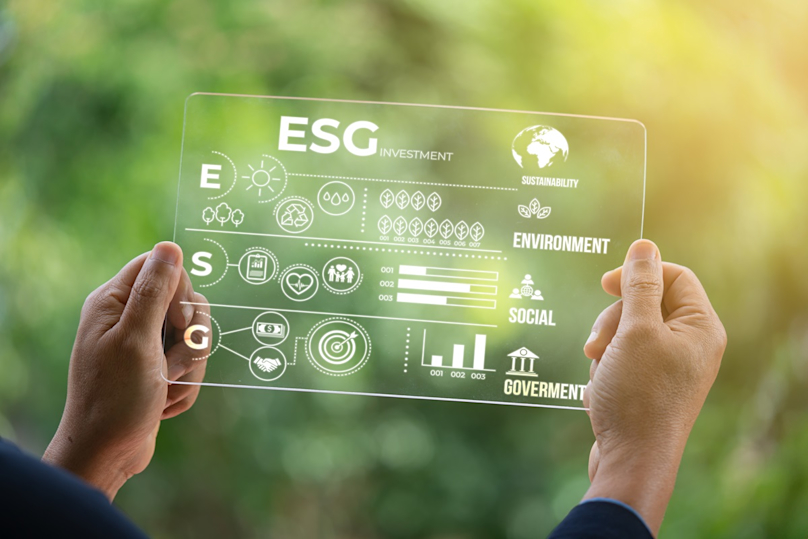Introduction
As businesses increasingly recognize the importance of sustainability and ethical operations, small and medium-sized enterprises (SMEs) are seeking ways to incorporate Environmental, Social, and Governance (ESG) criteria into their daily practices. ESG software solutions play a critical role in this transition, providing SMEs with streamlined tools to track, manage, and report their ESG metrics, ensuring compliance, and fostering transparency.
But ESG tools do more than just ensure compliance; they drive innovation, attract investors, and enhance brand reputation. By offering data-driven insights, these tools enable companies to identify areas for ESG improvement, set meaningful goals, and communicate their sustainability efforts effectively. In today's marketplace, where consumers and stakeholders increasingly demand corporate responsibility, the right ESG software can empower your business to tell a compelling sustainability story.
Whether your goal is to reduce your carbon footprint, promote workplace diversity, or strengthen governance practices, comprehensive ESG software can transform complex sustainability challenges into manageable tasks. This shift allows your business to adapt and thrive in a conscientious and evolving business landscape. Are you ready to explore the top ESG software solutions that can help drive your SME towards more sustainable and ethical business practices?
What is ESG?
As businesses strive to make ethical and sustainable choices, they often rely on Environmental, Social, and Governance (ESG) criteria as a guiding framework. ESG represents a set of standards that help businesses operate responsibly and sustainably, balancing profitability with positive societal impact. Both companies and investors use these criteria to evaluate potential risks and opportunities related to sustainability.
Understanding ESG Criteria
ESG criteria encompass three critical dimensions. Environmental factors assess a company's impact on the planet, such as its resource usage, waste management, and carbon footprint. Social factors evaluate how a company interacts with employees, customers, and the broader community, focusing on aspects like workplace diversity, labor practices, and community engagement. Governance factors examine a company’s internal practices, including leadership structure, ethics, transparency, and compliance with laws and regulations. Together, these components provide a holistic view of a company's commitment to sustainability and ethical business practices.
Components of ESG
Each component of ESG plays a vital role in measuring a company’s sustainability efforts. Environmental metrics track areas like energy efficiency, emissions, and waste reduction initiatives. Social metrics assess employee well-being, human rights, and community relations, while governance metrics evaluate leadership effectiveness, board diversity, and adherence to regulatory standards. By integrating these elements, businesses can better understand their overall ESG performance and identify areas for improvement.
Ultimately, ESG criteria serve as a roadmap for companies aiming to align their operations with sustainable and ethical standards, while also addressing the expectations of investors, customers, and other key stakeholders.
Importance of ESG Reporting
In today’s interconnected and transparent world, the importance of ESG reporting has never been more pronounced. For both public and private companies, demonstrating a commitment to ethical practices and sustainability through ESG reporting is essential for building trust and credibility with stakeholders. This practice not only enhances a company's reputation but also positions it to meet increasing regulatory demands and investor expectations.
The Role of ESG Data in Reporting
Data collection is the foundation of effective ESG reporting. Companies must establish robust systems to gather, manage, and analyze ESG data, ensuring that their reporting is accurate, comprehensive, and transparent. For SMEs, manual data collection can be time-consuming and prone to errors. ESG software solutions address this challenge by automating data collection and streamlining processes, making it easier to manage and report on key metrics such as greenhouse gas emissions, diversity statistics, and governance structures. As discussed in Mobile Reality's article on ESG investing empowered by data science, data science enhances the accuracy and depth of ESG data, transforming how companies assess and report on their sustainability metrics.
From Data to Sustainability Reports
Once data is collected and analyzed, it needs to be compiled into a sustainability report. This document details the company’s ESG performance, outlines its sustainability goals, and communicates its progress to stakeholders, including investors, employees, and customers. ESG reporting software simplifies this process by aggregating data from various sources and presenting it in a cohesive, easy-to-understand format. A well-crafted sustainability report is a powerful tool for showcasing a company’s commitment to responsible practices and for engaging stakeholders.
Enhancing Stakeholder Engagement
Transparent ESG reporting plays a crucial role in building and maintaining strong relationships with stakeholders. By providing clear and accessible information on sustainability efforts, companies can foster trust and support from key stakeholders, including investors who prioritize responsible investments and consumers who value corporate responsibility. In this way, ESG reporting not only strengthens a company’s ethical standing but also contributes to long-term business success.
Criteria for Evaluating ESG Tools
First and foremost, user-friendliness ensures that your team can easily adopt and utilize the tool. Comprehensive data coverage guarantees that all key ESG metrics are measured accurately. Integration capabilities allow the ESG software to enhance compliance. These tools ensure all necessary data is collected and reported accurately. They help organizations stay up-to-date with evolving ESG regulations and standards. Automated data collection reduces the risk of human error in the compliance reporting process. Finally, cost-effectiveness is essential for SMEs with limited budgets.
Top 10 ESG Tools Selection
Tool Name | Primary Focus | Key Features |
IBM Envizi ESG Suite | Comprehensive ESG management | Data collection, analysis, reporting, emissions tracking, target setting |
KEY ESG | ESG data management and reporting | Customizable dashboards, automated reporting, progress tracking |
VelocityEHS Global Enterprise ESG & EHS | Combined ESG and EHS management | Emissions tracking, compliance management, incident reporting, ESG monitoring |
ServiceNow ESG Management | Integrated ESG management | Real-time insights, automated workflows, reporting capabilities |
Benchmark Gensuite® EHS | EHS and ESG management | Compliance management, sustainability reporting, risk assessment |
ESGenius! | Specialized ESG management | Data collection, analysis, visualization, customizable dashboards |
ESG Flo | User-friendly ESG reporting | Intuitive data collection, automated calculations, customizable reporting templates |
TECH EHS Software | Integrated EHS and ESG management | Risk assessment, compliance management, sustainability reporting |
EcoVadis | Sustainability ratings and assessment | Supplier assessment, risk management, performance improvement |
AuditBoard | Integrated risk and ESG management | Risk management solutions |
Are you ready to discuss and work on your digital product idea?

AuditBoard
AuditBoard: 4.6 out of 5 stars (979 reviews)
AuditBoard is a cloud-based platform that offers integrated risk management solutions, including ESG management capabilities. While primarily known for its audit and compliance tools, AuditBoard has expanded its offerings to address the growing need for ESG reporting and management. The platform helps organizations streamline their ESG data collection, analysis, and reporting processes, enabling them to more effectively meet regulatory requirements and stakeholder expectations.
ServiceNow ESG Management
ServiceNow ESG Management: 4.46 out of 5 stars (14 reviews)
ServiceNow ESG Management is an integrated solution within the ServiceNow platform, designed to help organizations manage their ESG initiatives. It offers tools for data collection, goal setting, and progress tracking across various ESG metrics. The software provides real-time insights, automated workflows, and reporting capabilities to streamline ESG processes. It leverages ServiceNow's existing infrastructure to connect ESG efforts with other business operations.
ESGenius
ESGenius: 4.46 out of 5 stars (14 reviews)
ESGenius! is a specialized ESG management software designed to simplify sustainability reporting and performance tracking. It offers features for data collection, analysis, and visualization of key ESG metrics. The platform provides customizable dashboards and reporting tools to help organizations monitor their ESG progress. ESGenius! aims to make ESG management more accessible and efficient for businesses of various sizes.
KEY ESG
KEY ESG: 4.47 out of 5 stars (19 reviews)
KEY ESG is a software solution designed to simplify ESG data management and reporting. It provides a centralized platform for collecting, analyzing, and visualizing ESG data across an organization. KEY ESG offers customizable dashboards, automated reporting features, and tools for tracking progress against sustainability goals. The platform helps companies streamline their ESG processes and improve transparency in their sustainability efforts.
VelocityEHS Global Enterprise ESG & EHS Software
VelocityEHS Global Enterprise ESG & EHS Software: 4.37 out of 5 stars (15 reviews)
VelocityEHS offers a comprehensive ESG and Environmental Health and Safety (EHS) software suite. It combines robust ESG management tools with EHS functionalities, providing a holistic approach to sustainability and workplace safety. The platform includes features for emissions tracking, compliance management, incident reporting, and ESG performance monitoring. VelocityEHS helps organizations meet regulatory requirements while improving their overall sustainability performance.
IBM Envizi ESG Suite
IBM Envizi ESG Suite: 4.32 out of 5 stars (28 reviews)
IBM Envizi is a comprehensive ESG platform that helps organizations manage and report on their sustainability performance. It offers data collection, analysis, and reporting tools across various ESG metrics. The suite enables companies to track emissions, set targets, and generate insights for informed decision-making. With its robust features, Envizi assists businesses in meeting regulatory requirements and stakeholder expectations.
Benchmark Gensuite® EHS
Benchmark Gensuite® EHS: 4.0 out of 5 stars (12 reviews)
Benchmark Gensuite® EHS is a cloud-based software suite that combines Environmental Health and Safety Management with ESG functionalities. It offers modules for compliance management, sustainability reporting, and risk assessment. The platform provides tools for data collection, analysis, and visualization of ESG metrics. Benchmark Gensuite® EHS helps organizations streamline their EHS and ESG processes while ensuring regulatory compliance.
EcoVadis
Ecovadis: 3.95 out of 5 stars (32 reviews)
EcoVadis is a sustainability ratings platform that assesses companies' ESG performance across global supply chains. It provides detailed scorecards and benchmarking tools to help organizations understand and improve their sustainability practices. EcoVadis offers features for supplier assessment, risk management, and performance improvement. The platform helps companies enhance their ESG efforts and promote sustainable procurement practices.
TECH EHS Software
TECH EHS Software: 3.0 out of 5 stars (1 review)
TECH EHS Software is a comprehensive solution that integrates Environmental Health and Safety Management with ESG functionalities. It provides tools for risk assessment, compliance management, and sustainability reporting. The platform offers features for data collection, analysis, and visualization of ESG metrics. TECH EHS Software helps organizations improve their overall EHS performance while addressing ESG requirements.
ESG Flo
ESG Flo: 5.0 out of 5 stars (1 review)
ESG Flo is a user-friendly ESG management platform that focuses on simplifying the ESG reporting process. It offers intuitive data collection tools, automated calculations, and customizable reporting templates. ESG Flo helps organizations track their sustainability performance, set goals, and generate reports for various stakeholders. The platform aims to streamline ESG management for companies at different stages of their sustainability journey.
Benefits of Using ESG Tools
Utilizing ESG tools can offer numerous benefits. These tools enhance compliance by ensuring all necessary data is collected and reported accurately. They streamline the audit process, making it easier to verify your ESG claims. Most importantly, they support continuous improvement by identifying areas where your business can enhance its sustainability practices.
Enhanced Compliance: These tools ensure all necessary data is collected and reported accurately. They help organizations stay up-to-date with evolving ESG regulations and standards. Automated data collection reduces the risk of human error in compliance reporting.
Streamlined Audit Process: ESG tools make it easier to verify ESG claims by providing centralized, organized data. They offer audit trails and data provenance, enhancing transparency and credibility. Standardized financial reporting formats simplify external audits and stakeholder reviews.
Support for Continuous Improvement: These tools identify areas where businesses can enhance their sustainability practices. They provide benchmarking capabilities to compare performance against industry peers. Regular monitoring and reporting facilitate goal-setting and progress tracking.
Improved Risk Management: ESG tools help identify and assess sustainability-related risks to the business. They provide early warning systems for potential ESG issues. Integration with other business systems allows for a more holistic approach to risk management.
Enhanced Stakeholder Communication: These tools generate comprehensive reports that can be shared with investors, customers, and other stakeholders. They facilitate transparent communication of ESG efforts and achievements. Customizable ESG reporting software options cater to different stakeholder needs and preferences.
Operational Efficiency: By centralizing ESG data collection and analysis, these tools save time and resources. They can highlight areas of inefficiency in resource use, leading to cost savings. Integration capabilities reduce data silos and improve cross-departmental collaboration.
Strategic Decision-Making: ESG tools provide data-driven insights that can inform strategic business decisions. They help align sustainability initiatives with overall business objectives. Long-term trend analysis supports future planning and sustainable growth strategies.
Competitive Advantage: Robust ESG practices, supported by these tools, can enhance brand reputation. They can help attract and retain environmentally and socially conscious customers and employees. Strong ESG software performance can lead to improved access to capital and better financial terms.
By leveraging these benefits, organizations can not only improve their ESG performance but also drive overall business value and long-term sustainability.
Conclusion
Incorporating ESG criteria into your business practices is not just a compliance necessity but a strategic advantage. ESG software solutions simplify the process of tracking and ESG reporting software maintains your sustainability metrics, making it easier for SMEs to join the ranks of ethically responsible and transparent businesses.
By adopting the right ESG tools, you can not only meet regulatory requirements but also build strong relationships with your stakeholders, identify new growth opportunities, and ensure long-term success. Your journey towards sustainability and ethical practices begins with the right tools—so why wait?
What's your take on the current state of ESG reporting, and how do you think it will evolve over the next decade?
In the ever-evolving landscape of business ethics and sustainability, one thing remains clear: ESG Software is here to stay. As more companies recognize the importance of ESG criteria, the tools and solutions available will continue to grow and improve, making it easier for businesses of all sizes to embrace sustainable practices. Now's the time to start leveraging these tools to future-proof your business and contribute to a better world.
Frequently Asked Questions
What is an ESG software?
ESG software is a tool that helps companies track, analyze, and report on their environmental, social, and governance performance. It helps businesses manage their sustainability efforts more efficiently and transparently.
What does ESG mean?
ESG stands for Environmental, Social, and Governance. These are the three key factors used to measure the sustainability and ethical impact of an investment in a company or business.
What is ESG programming?
ESG programming refers to the process of integrating environmental, social, and governance criteria into a company's business strategy and decision-making processes. This programming helps organizations align their operations with sustainability goals and ethical practices.
What is a company ESG program?
A company ESG program is a set of policies, initiatives, and practices that focus on improving the company's environmental impact, social responsibility, and corporate governance. It involves implementing strategies to address issues such as climate change, diversity and inclusion, and board diversity.




